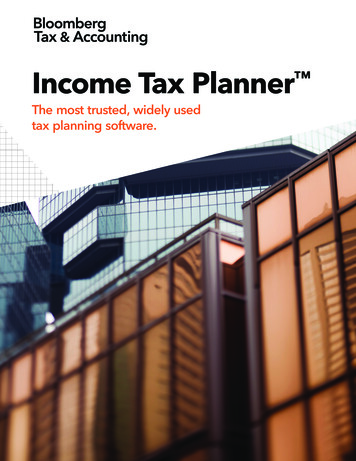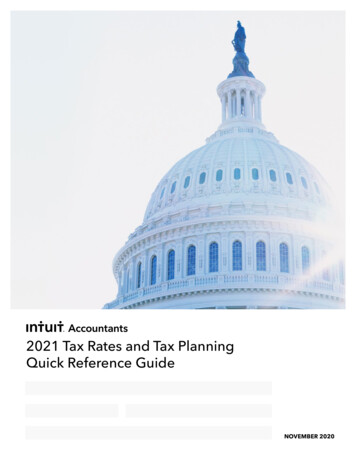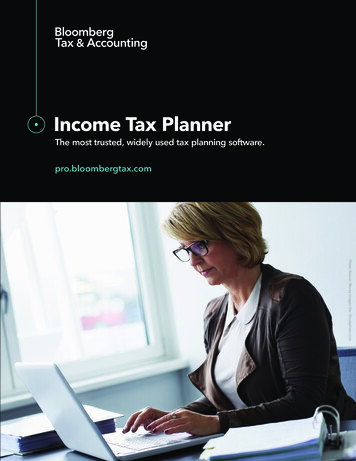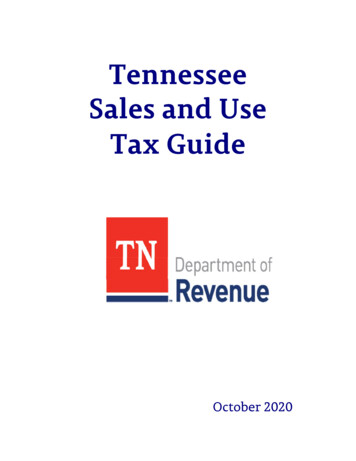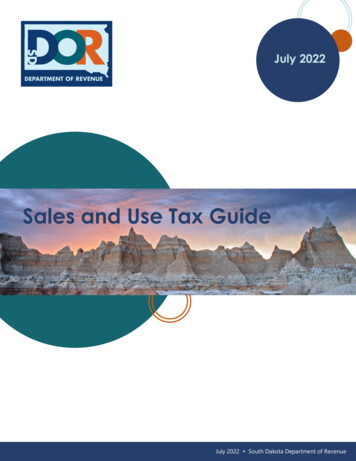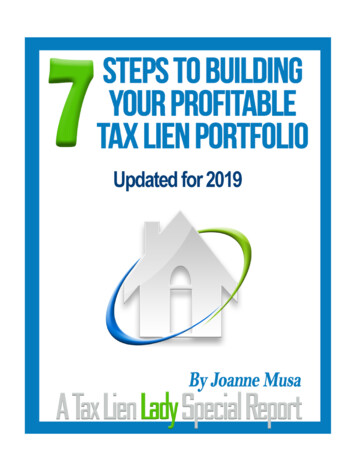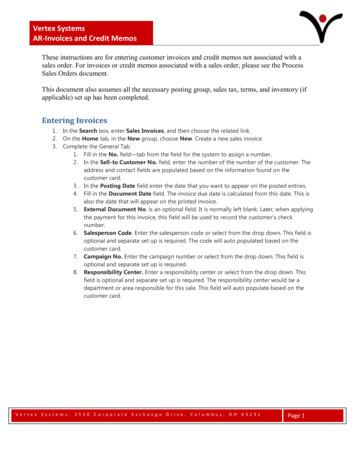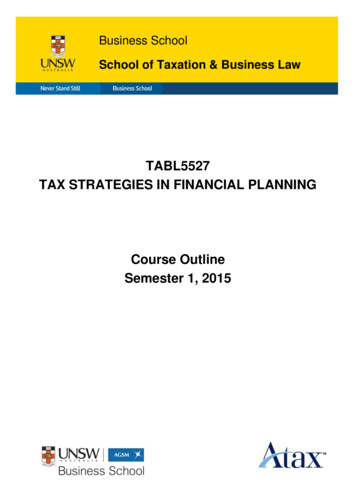
Transcription
Business SchoolSchool of Taxation & Business LawTABL5527TAX STRATEGIES IN FINANCIAL PLANNINGCourse OutlineSemester 1, 2015
TABL5527 Tax Strategies in Financial PlanningEdition Semester 1, 2015 Copyright The University of New South Wales, 2015No part of this publication may be reproduced or transmitted in anyform or by any means, electronic or mechanical, includingphotocopying, recording, or by any information storage and retrievalsystem, without the prior written permission of the Head of School.Copyright for acknowledged materials reproduced herein is retained by the copyrightholder.All readings in this publication are copied under licence in accordance with Part VBof the Copyright Act 1968.AUTHORGordon Mackenzie CABSc LLB (Monash) LLM (Sydney) Grad DipSecurities Analysis F Fin FTIAREVISIONS FOR 2015 BY:Gordon Mackenzie(Materials updated as at February 2015)Educational Design & Desktop Publishing by:Blueprint Educational Services P/Lhttp://www.b-print.com.auP.O. Box 54Stanhope Gardens NSW, 2768Outline Page 2Atax
TABL5527 Tax Strategies in Financial PlanningContentsCOURSE OUTLINEAbout the lecturer. 4Letter of introduction . 5Introduction to the course. 6Student learning outcomes and goals . 8How to use this package . 10Key to instructional icons. 11Profile of this course . 12Course description . 12Textbooks and references . 13Supporting your learning. 14Conferencing. 14School of Taxation & Business Law Website . 15Atax Student Guide . 15Library and resources. 15Online learning in this course . 16Other support . 17Academic Honesty and Plagiarism . 18Assessment: Postgraduate Students (TABL5527) . 20Suggested study schedule (Distance students) . 29Appendix A—Assignment preparation and submissionSample Examination PaperSTUDY GUIDEModule 1Module 2Module 3Module 4Module 5Module 6AtaxFinancial planning and taxationTaxation concessions for savingTaxation of funding vehiclesTaxation of retirement paymentsEstate taxationTaxation and portfolio constructionOutline Page 3
TABL5527 Tax Strategies in Financial PlanningAbout the lecturerGordon Mackenzie CABSc LLB (Monash) LLM (Sydney) Grad Dip Securities Analysis F FinFTIAGordon is a senior lecturer and joined Atax in February 2002. He has30 years experience in the field of superannuation, as an industrypractitioner, consultant and teacher. His roles have included: technical services director at AMP Ltd (30 qualified staffserving 3000 financial planners) superannuation lawyer responsible for superannuation fundsholding 50bn in assets teaching Taxation of Superannuation at postgraduate masterslevel developing and teaching ‘Tax Strategies in Financial Planning’curricula—an advanced course in the taxation of personal wealth authorship of Taxation of Superannuation for HalsburyAustralia.He has a Bachelor of Science (Biochem) and Bachelor of Laws fromMonash University, a Master of Laws from Sydney University and aGraduate Diploma in Securities Analysis from the Financial ServicesInstitute of Australia. Gordon has extensive experience in corporate taxation,including restructures both domestically and internationally, and crossborder transactions.Gordon has prepared and presented submissions to Government on behalf ofmany industry bodies and corporates in the financial services sector, onsuperannuation and international taxation, and securities law matters. He hasalso presented to Senate Standing committees on a number of occasions.Outline Page 4Atax
TABL5527 Tax Strategies in Financial PlanningLetter of introductionWelcome to TABL5527 Taxation Strategies in Financial Planning.This course looks at all the financial planning taxation strategies thatare in the market place at the moment. We will drill down into thetechnicals supporting them, and then look to see how they measure upwith Government policy.We have surveyed the market for all the taxation strategies that arecurrently being used. No doubt there are others that will come to lightover the course of the semester.What you will notice is that this course is heavily focused on taxationstrategies which are related to superannuation. This is becausesuperannuation funds are the primary method used by financialplanners for creating wealth. However, we have gone beyond taxationof superannuation in this course to look at other vehicles which can beused for wealth creation (these include negative gearing, residentialhousing and small business).The teaching strategies used in this course are to ‘interogate’ therelevant rules then demonstrate how they are applied—either byActivities or by using examples. The empahasis on active learning andpractical application is intended to assist you to demonstrate, first, yourunderstanding of the rules and, secondly, that you can apply them to afactual situation.You should seek to come out of the course not only knowing what theexisting strategies are, but also how new taxation strategies aredeveloped in financial planning.Gordon MackenzieAtaxOutline Page 5
TABL5527 Tax Strategies in Financial PlanningIntroduction to the courseRelationship to other courses in programThis course is related to TABL5510 Taxation of Superannuation. Itgoes further than the technical analysis in that course to cover theefficient use of all tax concessions that are available for financialplanning.Course summaryThe course starts off by looking at the market for wealth accumulationand financial planning in Australia, examining how the wealth is held,who manages it etc.The course then follows the traditional way of teaching financialplanning by covering tax strategies of accumulating, taxation of thefunding vehicles that are used in financial planning and taxation whenthe funds are ‘drawn down’ (paid).Finally, it also looks at how taxation impacts on constructing aninvestment portfolio in a superannuation fund.Course objectivesThis course provides students with a comparison between the differenttaxation treatment of investments and funding vehicles used infinancial planning that, in turn, can give rise to different investmentstrategies and portfolio construction in a personal financial planningenvironment. Students will acquire a good grounding in comparisonsbetween the taxation of these investment strategies and fundingvehicles.Upon completion of this course, you should be able to demonstrate:Outline Page 6 a solid understanding of the technical taxation rules in each ofthe areas discussed, and an ability to apply those rules to practical scenarios.Atax
TABL5527 Tax Strategies in Financial PlanningCourse evaluation and quality enhancementThe School of Taxation & Business Law’s quality enhancementprocess involves regular review of its courses and study materials bycontent and educational specialists, combined with feedback fromstudents. Towards the end of the semester, you will be asked tocomplete an online survey via myUNSW to evaluate the effectivenessof your course lecturer and the actual course content. These surveysare administered as part of the UNSW Course and Teaching Evaluationand Improvement process (‘CATEI’). Your input into this qualityenhancement process through the completion of these surveys isextremely valuable in assisting us in meeting the needs of our studentsand in providing an effective and enriching learning experience. Theresults of all surveys are carefully considered and do lead to actiontowards enhance the quality or course content and delivery.Feedback received from students in previous years has helped us tocontinually develop the content of this course. It has allowed us toensure that the content is up to date and relevant and that the coursefocuses effectively on taxation and personal wealth accumulation.Student responsibilities and conductStudents are expected to be familiar with and to adhere to universitypolicies in relation to attendance, and general conduct and behaviour,including maintaining a safe, respectful environment; and tounderstand their obligations in relation to workload, assessment andkeeping informed.You are expected to conduct yourself with consideration and respectfor the needs of your fellow students and teaching staff. Moreinformation on student conduct is available Students.htmlGuide to online behaviour: https://student.unsw.edu.au/online-studyYou should take note of all announcements made in lectures, tutorials,the Atax Bulletin, or on the course Website (Moodle). From time totime, the School or the University will send important announcementsto your university e-mail address without providing you with a papercopy. You will be deemed to have received this information. It is alsoyour responsibility to keep the University informed of all changes toyour contact details.Information and policies on these topics can be found in the ‘A-ZStudent Guide: https://my.unsw.edu.au/student/atoz/A.html andspecific information for students studying taxation programmes can befound in the Atax Student Guide. See, especially, information onAttendance and Absence, Academic Misconduct, AssessmentInformation, Examinations, Student Responsibilities, Workload andpolicies such as Occupational Health and Safety.AtaxOutline Page 7
TABL5527 Tax Strategies in Financial PlanningStudent learning outcomes and goalsLearning outcomes are what you should be able to do by the end ofthis course if you participate fully in learning activities andsuccessfully complete the assessment items. The learning outcomes inthis course will help you to achieve some of the overall learning goalsfor your program. These program learning goals are what we want youto be or have by the time you successfully complete your degree. Thefollowing is a list of the UNSW Business School program learninggoals for both undergraduate and postgraduate students.Postgraduate Coursework Program Learning Goals1.2.3.4.5.Outline Page 8Knowledge: Our graduates will have current disciplinary orinterdisciplinary knowledge applicable in local and global contexts.You should be able to identify and apply current knowledge ofdisciplinary or interdisciplinary theory and professional practiceto business in local and global environments.Critical thinking and problem solving: Our graduates willhave critical thinking and problem solving skills applicable tobusiness and management practice or issues.You should be able to identify, research and analyse complexissues and problems in business and/or management, andpropose appropriate and well-justified solutions.Communication: Our graduates will be effectivecommunicators in professional contexts.You should be able to:a) Produce written documents that communicate complexdisciplinary ideas and information effectively for theintended audience and purpose, andb) Produce oral presentations that communicate complexdisciplinary ideas and information effectively for theintended audience and purpose.Teamwork: Our graduates will be effective team participants.You should be able to participate collaboratively andresponsibly in teams, and reflect on your own teamwork, and onthe team’s processes and ability to achieve outcomes.Ethical, social and environmental responsibility: Our graduateswill have a sound awareness of ethical, social, cultural andenvironmental implications of business issues and practice.You should be able to:a) Identify and assess ethical, environmental and/orsustainability considerations in business decisionmaking and practice, andb) Consider social and cultural implications of businessand /or management practice.Atax
TABL5527 Tax Strategies in Financial PlanningThe following table shows how your Course Learning Outcomes relateto the overall Program Learning Goals, and indicates where these aredeveloped and assessed:Program Learning GoalsThis course helps you toachieve the following learninggoals:1KnowledgeCourse Learning OutcomesCourse AssessmentItemOn successful completion of the course, you shouldbe able to:This learning outcomewill be assessed in thefollowing items:Apply tax law in practice, by learning the law in thecontext of its application to real world factualcircumstances and transactions.Module ActivitiesCritically assess the relevance and signficance ofvarious tax concessions in the context of financialplanning.ExaminationAssignmentsEvaluate the application of tax law from a policyperspective.2Critical thinkingand problemsolvingDemonstrate skills of statutory construction and theability to critically review interpretations oflegislative provisions, in applying taxation rules to toa wide range of specific situations.Module ActivitiesAssignmentsExaminationDemonstrate an ability to conduct a literature surveyto identify appropriate and relevant sources, and toeffectively analyse and apply these sources in theconstruction of legal argument.3aWrittencommunicationRecognise and resolve legal and tax problems anddevelop clear, effective and well-reasoned analysis ofthe tax consequences of practical scenarios using theconventions of legal essay writing.AssignmentsExaminationApply correct citation and referencing conventions inproperly acknowledging all source material used.3bOralcommunicationNot specifically addressed in this course.4TeamworkNot specifically addressed in this course.5a.Ethical,environmental andsustainabilityresponsibilityNot specifically addressed in this course.5b.Social and culturalawarenessNot specifically addressed in this course.AtaxOutline Page 9
TABL5527 Tax Strategies in Financial PlanningHow to use this packageIf you are new to flexible learning you should carefully read thisCourse Outline. It contains most of the relevant information abouthow this course will be run and the expectations of you as a student.You should also refer to the Suggested Study Schedule at the end ofthis Course Outline as a guide to completing your coursework. So as toget the most out of your study we recommend that you follow thisstudy schedule through the course and fit various time demands into awell-organised diary. Systematic study through the Semester is the keyto success in a flexible learning program.The Study Guide (which includes this Course Outline and theindividual Modules and is sometimes referred to as the study materialsor course materials) can help you in three ways.1.It sets out a clear path of study over the Semester and helps youplan your workload. It also identifies learning outcomes and keyconcepts at the start of each module and provides a series ofactivities to help you learn actively and manage your ownprogress through the course.2.It contains the core content for the course (often withreference to legislation, textbooks and other relevant material).The structure and layout of the Study Guide is designed tohighlight key points and assist your revision for assignments,research papers and examinations.3.It tells you when to refer to textbooks, legislation and otherreadings, giving precise details of what you should read.Features of the Study GuideEach module includes a range of features to assist you in managingyour learning and developing study skills. These features include: Overview page Heading levels Learning outcomes and key concepts Module text Activities and feedback Readings Margin notes Instructional iconsPlease familiarise yourself with the Key to Instructional Icons on thefollowing page. These icons are intended to help you navigate thestudy materials and to encourage active learning.Outline Page 10Atax
TABL5527 Tax Strategies in Financial PlanningKey to instructional iconscompulsory readingoptional readingnote this important pointrecall earlier workdiscuss with colleagueaccess Moodle orthe internetuse video resourceuse softwarewrite responses outsidethe Study Materialswrite response in theStudy Materialspause to reflectprepare for discussion in anAudio Conference or Webinardiscuss with study groupundertake investigationor researchuse audio resourceperform fieldworkOnly some of the media shown in the instructional icons are used in this course.AtaxOutline Page 11
TABL5527 Tax Strategies in Financial PlanningProfile of this courseCourse descriptionCourse number/sTABL5527Course nameTax Strategies in Financial PlanningUnits of credit6Suggested studycommitmentYou should plan to spend an average of 10–12 hours per week on thiscourse to perform well (including class attendance, onlineparticipation, assignments, examination preparation etc).The information included on the overview page of each moduleshould help you plan your study time.Semester and yearSemester 1, 2015Lecturer/sGordon MackenzieContact detailsTelephone: 61 (2) 9385 9521Fax: 61 (2) 9313 6658Email:gordon.mackenzie@unsw.edu.auOutline Page 12Atax
TABL5527 Tax Strategies in Financial PlanningTextbooks and referencesPrescribed textbook/sThere is no prescribed textbook for this course.Act/sYou must purchase or have access to the following publication/s.Income Tax Assessment Act 1936Income Tax Assessment Act 1997Superannuation Industry (Supervision) Act 1993These are referred to throughout the Study Guide as ‘Act’.Citation and style guideIn presenting written work for assessment in this course you must usean appropriate and consistent style for referencing and citation.The following is a selection of acceptable citation and style guides,which you may use as the basis for your written work. You mustpurchase or have access to one of the following publications.Australian guide to legal citation (Melbourne University Law ReviewAssociation & Melbourne Journal of International Law, 3rd ed, 2010).Available from http://mulr.law.unimelb.edu.au/go/aglc.(This is free to download and is the citation style guide used by themajority of Australian legal journals.)Rozenberg P, Australian guide to uniform legal citation (Sydney:Lawbook Co, 2nd ed, 2003).Stuhmcke A, Legal referencing (Sydney: LexisNexis, 4th ed, 2012).Recommended reference/sBelow is a list of further references that you may find useful in thiscourse. Purchase of recommended references is not compulsory.Woodley M (ed), Osborn’s Concise Law Dictionary (London: Sweet& Maxwell, 12th e ed).This is the classic, concise dictionary of legal terms which is very useful for studentsof law based subjects.2014/2015 Australian Master Superannuation Guide (Sydney: CCHAustralia Ltd, 18th ed 20142014/2015 Australian Master Financial Planning Guide (Sydney:CCH Australia, 17th ed 2014).AtaxOutline Page 13
TABL5527 Tax Strategies in Financial PlanningSupporting your learningConferencingConferences may be either in the form of an audio conference(conducted by telephone) or a webinar (ie, a web-based Conferenceconducted over the Internet). Instructions on preparing for andparticipating in audio conferences and webinars are available on theTaxation & Business Law website and in your course Moodle website.These Conferences provide an opportunity for you to clarify andextend your understanding of the material in this course. They aredesigned to try out new ideas and give you a forum to ask questionsand discuss issues with your lecturer and other students. Do not beafraid to participate—it is only by trying out new ideas and exploringtheir dimensions that you will learn in any real depth.Thorough preparation is essential if you are to gain maximum benefitfrom a Conference. You can only start to come to grips with materialif you work on it actively. As a general rule each Conference willcover the module/s between the previous Conference and the week itfalls within on the Suggested Study Schedule. However, more specificinformation on material to be covered in each Conference may beprovided via Moodle throughout the Semester (see ‘Online learning inthis course’ below). Exact dates and times for Conferences will beadvised via a timetable that you will find on Moodle and on the TBLWebsite (under Timetables).There are six audio conferences for this course during the Semester.The Suggested Study Schedule in this Outline indicates in whichweeks Conferences will be held. Each Conference is of approximatelyone and a half hours duration.Remember Conferences are not lectures—your active participationis an important part of the learning experience and preparationfor examinations!Outline Page 14Atax
TABL5527 Tax Strategies in Financial PlanningSchool of Taxation & Business LawWebsiteThe School of Taxation & Business Law’s website is taxationbusiness-lawIn addition to general information for all of the School’s students andvisitors, there is a portal under Student Resources which containsinformation specific to those students undertaking flexible learningcourses—for example, information about exams, timetables and theWeekly hools/taxationbusiness-law/student-supportAtax Student GuideThe Atax Student Guide is a vital source of information for studentsstudying flexible learning courses. It provides administrative and otherinformation specific to studying these courses and you should make apoint of being familiar with its contents. You can access the 2015 AtaxStudent Guide from your Moodle course website(s).Library and resourcesThere are several resources that you can access from the School ofTaxation & Business Law website to help you with your academic andresearch goals. Online tax and legal resources can be found From this site you can access: The UNSW Library’s catalogue, online databases and e-journals The UNSW Learning Centre for online academic skillsresources (eg, essay and assignment writing, plagiarism), and Gateway’ links to legislation, case law, tax and accountingorganisations and international tax agencies.UNSW LibraryUNSW Library provides information resources, services and researchsupport that can assist UNSW students complete their courserequirements. Online library resources such as online databases,e-books and e-journals are available 24 hours a day via the LibraryHomepage (http://www.library.unsw.edu.au/).AtaxOutline Page 15
TABL5527 Tax Strategies in Financial PlanningInformation about your borrowing rights for hardcopy resources isavailable from the Library Homepage. All students can use theInterLibrary Loan service to access resources not held within UNSWLibrary.Library Subject GuidesThe UNSW Library has developed Subject Guides which identifymajor electronic resources in specific subject areas and are the idealstarting point for research.Subject GuidesThere are a range of Subject Guides in Business and Law topics, and aguide specific to electronic Taxation resources in the Taxation SubjectGuide at ion.Getting Library helpThe Help Zones are where you can find library staff to help you. Theyare located just inside the entrance to each library.See opening hours for staffed hours of library Help Zones.See Contact Us for telephone numbers of the Help Zones.Help Zone staff can assist you with: locating journal articles, cases and legislation searching on-line databases and e-journals loans of booksYou can also use the ‘Ask Us’ icon on the Library Homepage to askthe Library a question online.For library related queries you can also contact the Faculty OutreachLibrarian to the UNSW Business School.Online learning in this courseUNSW Australia uses an online learning platform called ‘Moodle’.You should try to familiarise yourself with Moodle early in thesemester. The Moodle course websites are where lecturers postmessages and deliver documents to their class, where students cancomplete quizzes, submit assignments and participate in discussions,etc. This platform is an important link between you, your lecturer andyour peers, and you should make a habit of regularly accessing yourMoodle course website as part of your study regime.All of the School’s flexible learning courses will have a Moodle coursewebsite, which is accessible only by students enrolled in that particularcourse. The contents of each site will vary, but at a minimum willOutline Page 16Atax
TABL5527 Tax Strategies in Financial Planningprovide you with information about the course, course content,assignment submission, email, relevant links to online resources andthe opportunity to network with fellow students. In addition,Conferences will be recorded and made available via Moodle.Log into Moodle from: https://moodle.telt.unsw.edu.au/.Moodle supportA complete library of how-to guides and video demonstrations on theMoodle learning management system is available via the UNSWTeaching Gateway at http://teaching.unsw.edu.au/elearning.Moodle technical supportIf you encounter a technical problem while using Moodle, pleasecontact the UNSW IT Service Desk via the following ts/Email:ITServiceCentre@unsw.edu.auTelephone: 61 (2) 9385 1333Phone and email support is available Monday to Friday 8am – 8pm,Saturday and Sunday 11am – 2pm. Online service requests can bemade via their website.Other supportAdditional support for students is available from the UNSW LearningCentre, which provides a range of services to UNSW students. TheLearning Centre website also features very helpful online resourceswhich may assist you to refine and improve your study skills. You canaccess these resources and find out more about the services available atwww.lc.unsw.edu.au.As well as the Learning Centre, the faculty’s Education DevelopmentUnit (EDU) provides academic writing, study skills and maths supportspecifically for UNSW Business School students. Services includeworkshops, online and printed resources, and individual consultations.For further information, urces/learningsupportThe EDU contact details are as follows:AtaxPhone: 61 (2) 9385 5584Email:edu@unsw.edu.auOutline Page 17
TABL5527 Tax Strategies in Financial PlanningThe ‘Academic Support’ section of the Atax Student Guide detailsfurther services available to assist in achieving success in a flexiblelearning environment.Those students who have a disability that requires some adjustment intheir teaching or learning environment are encouraged to discuss theirstudy needs with the course convenor prior to, or at the commencementof, their course, or with the Equity Officer (Disability) in the UNSWEquity and Diversity Unit (telephone: 61 (2) 9385 4734; email:seadu@unsw.edu.au). Issues to be discussed may include access tomaterials, signers or note-takers, the provision of services andadditional exam and assessment arrangements. Early notification isessential to enable any necessary adjustments to be made. For furtherinformation, you may also wish to look at the Student Equity andDisabilities Unit homepage at http://www.studentequity.unsw.edu.au/Academic Honesty and PlagiarismUNSW has an ongoing commitment to fostering a culture oflearning informed by academic integrity. All UNSW students andstaff have a responsibility to adhere to this principle of academicintegrity. Plagiarism undermines academic integrity and is nottolerated at UNSW.The University regards plagiarism as a form of academic misconduct,and has very strict rules regarding plagiarism. For UNSW policies,penalties, and information to help you avoid plagiarism l as well as theguidelines in the online ELISE and ELISE Plus tutorials for all UNSWstudents: http://subjectguides.library.unsw.edu.au/elise.To see if you understand plagiarism, do this short .htmlFor information legal citation go quick-aglcThe following discussion of plagiarism is adapted from the UNSWwebsite at l.Plagiarism is using the words or ideas of others and presenting them asyour own. Plagiarism is a type of intellectual theft. It can take manyforms, from deliberate cheating to accidentally copying from a sourcewithout acknowledgement.Examples of plagiarism include: Outline Page 18direct duplication of the thoughts or work of another, includingby copying work, or knowingly permitting it to be copied—thisincludes copying materials, ideas or concepts from a book,article, report or other written document (whether published orunpublished), computer program or software, website, internet,Atax
TABL5527 Tax Strategies in Financial Planningother electronic resource, or another person’s assignment, or thestudent’s own assignment from a previous course, withoutappropriate acknowledgement quotation without the use of quotation marks paraphrasing another person’s work with very minor changekeeping the meaning, form and/or progression of ideas of theoriginal citing sources which have not been read, without acknowledgingthe ‘secondary’ source from w
TAX STRATEGIES IN FINANCIAL PLANNING Course Outline Semester 1, 2015 Business School School of Taxation & Business Law . TABL5527 Tax Strategies in Financial Planning . relevant rules then demonstrate how they are applied—either by Activities or by using examples. The empahasis on active learning and practical application is intended to .

